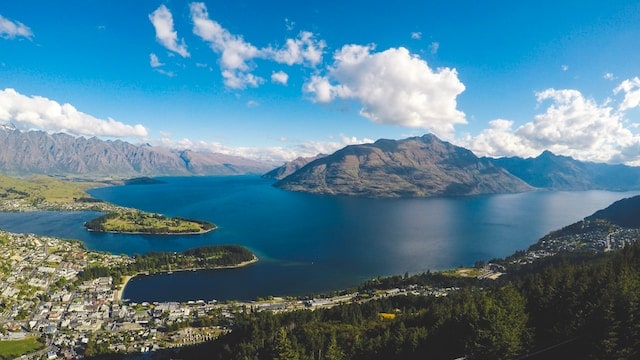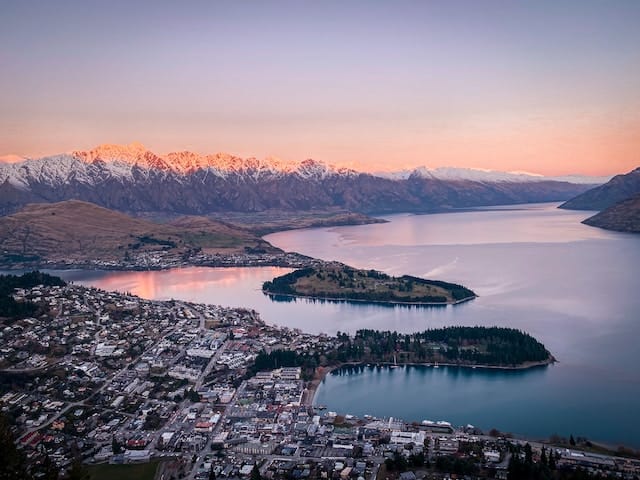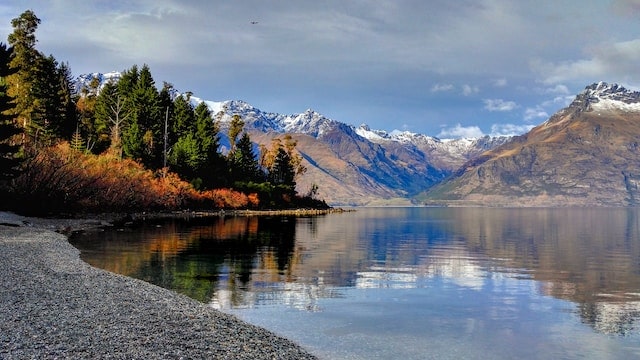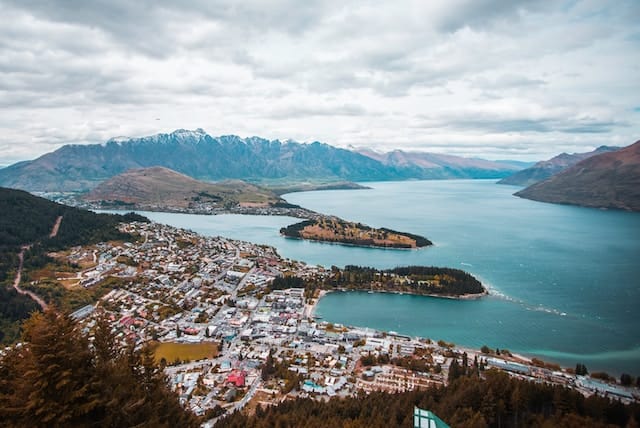Queenstown, located on the South Island of New Zealand, is a picturesque city known for its stunning landscapes, adrenaline-pumping activities, and relaxed atmosphere. Surrounded by the magnificent Southern Alps and nestled along the shores of Lake Wakatipu, Queenstown is a popular destination for both tourists and those seeking a change of scenery. This guide aims to provide you with comprehensive information about moving to Queenstown, covering essential aspects such as visa requirements, cost of living, housing, employment, and more. With this guide, you’ll be well-prepared for a smooth transition to life in this beautiful city.
Key Facts
| Fact Category | Details |
|---|---|
| Location | South Island, New Zealand |
| Population | Approximately 16,000 (2021) |
| Time Zone | New Zealand Standard Time (NZST; UTC+12) |
| Climate | Oceanic (mild winters, warm summers) |
| Main Language | English |
| Currency | New Zealand Dollar (NZD) |
| Primary Industries | Tourism, agriculture, film production, wineries |
| Land Area | 8,705 km² (Queenstown-Lakes District) |
| Public Transport | Orbus bus network |
| Airport | Queenstown Airport (ZQN) |
| Top Attractions | Lake Wakatipu, Remarkables, Coronet Peak, Skyline |
| Gondola, Shotover Jet, Gibbston Valley Wineries |
Visa and Immigration
When planning a move to Queenstown, it’s crucial to understand the various visa options available and the requirements for each type. The most common visas include:
- Visitor Visa: If you wish to explore Queenstown and the surrounding area before committing to a move, a visitor visa allows you to stay in New Zealand for up to nine months. Note that you are not allowed to work on this visa.
- Work Visa: To work in Queenstown, you’ll need to obtain a work visa. There are several categories, such as Essential Skills Work Visa, Work to Residence Visa, and Working Holiday Visa. Eligibility and requirements vary depending on the visa type, your nationality, and the job offer you have.
- Residence Visa: If you plan to live in Queenstown permanently, you’ll need to apply for a residence visa. Common options include the Skilled Migrant Category Resident Visa, which is based on a points system evaluating factors like age, work experience, and qualifications, and the Partner of a New Zealander Resident Visa.
- Student Visa: For those looking to study in Queenstown, a student visa is required. To be eligible, you must have an offer of a place in an approved educational institution and provide evidence of sufficient funds to cover your tuition and living expenses.
The visa application process typically involves completing an online application form, submitting the required documents, and paying the applicable fees. Processing times can vary, so it’s essential to apply well in advance of your planned move.
It’s important to stay up-to-date with New Zealand’s immigration laws and regulations, as they are subject to change. The Immigration New Zealand website is an excellent resource for detailed information on various visas, requirements, and application procedures.
Cost of Living
Understanding the cost of living in Queenstown is crucial for planning your move and setting a realistic budget. Here’s an overview of some common expenses:
- Currency and exchange rates: The official currency in New Zealand is the New Zealand Dollar (NZD). It’s essential to monitor exchange rates and consider their impact on your finances when moving to Queenstown. We highly recommend using a specialist money transfer service to transfer your funds.
- Housing costs: Renting is a popular option in Queenstown, with a range of properties available, from apartments to standalone houses. The cost of renting varies depending on the property type, size, and location. Rent for a one-bedroom apartment in the city center typically ranges from NZD 1,500 to NZD 2,000 per month.
- Utilities and other household expenses: In addition to rent, you’ll need to budget for utility costs, including electricity, water, and gas. These expenses can range from NZD 150 to NZD 250 per month for a one-bedroom apartment. Internet and phone services will add to your monthly expenses, with broadband internet costing around NZD 60 to NZD 100 per month.
- Food and dining expenses: Groceries in Queenstown can be relatively expensive compared to other cities in New Zealand due to its remote location. Expect to spend around NZD 300 to NZD 400 per month on groceries for a single person. Dining out can also be costly, with a meal at a mid-range restaurant averaging around NZD 30 to NZD 50 per person.
- Transportation costs: Queenstown has limited public transportation options, primarily consisting of buses. A monthly bus pass costs around NZD 100. Many residents choose to own a car for convenience. Keep in mind the costs associated with owning a vehicle, such as insurance, maintenance, and fuel. Alternatively, biking and walking are popular ways to get around the compact city center.
- Entertainment and leisure expenses: Queenstown offers various entertainment options, from adventure activities to cultural events. Prices can range from NZD 20 for a movie ticket to NZD 100 or more for adventure sports like bungee jumping or jet boating. Regular participation in leisure activities can add up, so it’s essential to budget accordingly.
| xpense Category | Average Cost | Notes |
|---|---|---|
| Housing (rent) | 1-bedroom apartment | NZD 1,600 – NZD 2,000/month (city center) |
| 1-bedroom apartment | NZD 1,300 – NZD 1,800/month (outside city center) | |
| 3-bedroom apartment | NZD 2,800 – NZD 3,800/month (city center) | |
| 3-bedroom apartment | NZD 2,400 – NZD 3,200/month (outside city center) | |
| Utilities | Basic utilities | NZD 150 – NZD 250/month (electricity, heating, cooling, water, garbage) |
| Internet (60+ Mbps) | NZD 70 – NZD 110/month | |
| Food and Dining | Meal at an | NZD 20 – NZD 30/person (mid-range restaurant) |
| inexpensive restaurant | NZD 12 – NZD 20/person | |
| Groceries | NZD 400 – NZD 600/month (per person) | |
| Transportation | Monthly bus pass | NZD 100/month |
| Gasoline (1 liter) | NZD 2.20 – NZD 2.60 | |
| Taxi (1 km) | NZD 2.80 – NZD 3.50 | |
| Entertainment & Leisure | Movie ticket | NZD 16 – NZD 20/person |
| Fitness club | NZD 60 – NZD 100/month | |
| Night out | NZD 100 – NZD 200/person (including drinks, food, and entertainment) | |
| Education | International school | NZD 15,000 – NZD 25,000/year (tuition fee) |
| Language courses | NZD 200 – NZD 400/month | |
| Healthcare | Private health | NZD 60 – NZD 150/month (individual plan) |
| insurance | ||
| Doctor’s visit | NZD 50 – NZD 100/visit (without insurance) |

Housing and Suburbs
Queenstown has several popular neighborhoods that cater to different lifestyles and preferences. Some of the most sought-after areas include:
- Queenstown Central: Located near the heart of the city, this area offers easy access to shops, restaurants, and entertainment options. It’s perfect for those who enjoy the hustle and bustle of city life. However, properties can be expensive, and parking can be challenging.
- Fernhill: Situated on the hillside overlooking Lake Wakatipu, Fernhill offers stunning views and a more tranquil environment. It’s popular with families and professionals and provides a mix of apartments, townhouses, and standalone homes.
- Frankton: As a growing suburb, Frankton offers more affordable housing options compared to the city center. It’s home to Queenstown’s airport and several shopping centers, making it a convenient location for residents.
- Arrowtown: A historic gold-mining town located about 20 minutes from Queenstown, Arrowtown offers a charming, village-like atmosphere. It’s popular among families and those seeking a quieter lifestyle.
To find a place to live in Queenstown, you can utilize online resources such as Trade Me Property and realestate.co.nz or work with a local real estate agent to assist you in your search. Keep in mind that the rental market can be competitive, so it’s essential to be proactive and prepared.
Lease agreements in New Zealand typically last for a fixed term, usually 12 months, with the option to renew. Tenant rights are protected by the Residential Tenancies Act, which outlines the responsibilities of both landlords and tenants, including maintenance, repairs, and rent increases.
Employment and Business
Queenstown offers a diverse job market, with opportunities in various industries. Some of the most prominent sectors include:
- Tourism and hospitality: As a popular tourist destination, Queenstown has a thriving tourism and hospitality industry, with numerous job opportunities in hotels, restaurants, bars, and tour companies.
- Construction and trades: With ongoing development in the region, there is a demand for skilled workers in construction, carpentry, plumbing, and other trades.
- Retail and customer service: The city’s shopping centers, supermarkets, and boutique stores offer various retail and customer service positions.
- Healthcare and education: Professionals in healthcare and education sectors can find opportunities in Queenstown’s hospitals, medical centers, and schools.
If you’re planning to set up a business in Queenstown, it’s essential to familiarize yourself with the local regulations and processes. New Zealand is known for its business-friendly environment, with relatively straightforward procedures for registering a company, obtaining necessary permits, and filing taxes. Resources like the New Zealand Companies Office and Inland Revenue websites provide valuable information on starting and operating a business in the country.
Networking can be a valuable tool in finding employment or growing your business in Queenstown. Several organizations and clubs cater to expats and professionals, such as the Queenstown Chamber of Commerce and local Meetup groups. These organizations can help you connect with like-minded individuals, share knowledge, and discover new opportunities.
Education and Schools
When moving to Queenstown with children, it’s essential to consider their education needs. The city offers a variety of schooling options, including public, private, and international schools. Public schools in New Zealand are generally of high quality, with a focus on providing well-rounded education. Private schools may offer smaller class sizes and additional extracurricular activities.
International schools, such as Wakatipu High School, cater to expat families and offer internationally recognized curricula, such as the International Baccalaureate (IB) program. These schools can provide a smoother transition for children who have attended international schools in other countries.
For those interested in learning the local language, English language courses are available at various institutions. Additionally, Queenstown has a limited number of options for higher education, with the Southern Institute of Technology (SIT) offering vocational and degree programs in various fields.

Healthcare
Queenstown offers both public and private healthcare facilities, ensuring residents have access to quality medical care. Public healthcare in New Zealand is funded by the government and provides essential medical services at little or no cost to residents. However, wait times for non-urgent procedures can be lengthy. Private healthcare facilities, such as the Queenstown Surgical Centre, offer shorter wait times and a wider range of services, but at a higher cost.
Health insurance is recommended, particularly for those opting for private healthcare. Numerous insurance providers offer various coverage options, depending on individual needs and preferences. It’s essential to research and compare policies to find one that best suits your requirements.
Finding a general practitioner (GP) or specialist in Queenstown is relatively straightforward. The New Zealand Medical Council’s website provides a searchable database of registered doctors, allowing you to find a suitable healthcare professional near your home. Pharmacies are widely available in Queenstown, with most medications requiring a prescription from a registered doctor.
Transportation
Navigating Queenstown and its surrounding areas is relatively simple, with a range of transportation options available. Public transportation in the city primarily consists of bus services operated by Orbus. The network covers most parts of Queenstown, including popular suburbs and attractions. A monthly bus pass costs around NZD 100, providing an affordable option for daily commutes.
Driving is another popular mode of transportation, offering flexibility and convenience for getting around the city and exploring the stunning landscapes beyond. When driving in Queenstown, it’s essential to familiarize yourself with local road rules and licensing requirements. If you’re planning to reside in the city long-term, you may need to obtain a New Zealand driver’s license.
For those who prefer a more active and environmentally friendly approach, Queenstown offers numerous biking and walking paths throughout the city. The compact city center is easily navigable by foot or bicycle, making it an attractive option for short trips and daily commutes.
Taxis and ride-sharing services, such as Uber, are also available in Queenstown. These options provide a convenient alternative for those without access to a car or who prefer not to drive.
Culture and Lifestyle
Adapting to the local culture and lifestyle is an essential part of settling into a new city. In Queenstown, English is the predominant language, but you may also encounter speakers of Māori, New Zealand’s indigenous language, and other languages due to the city’s diverse population.
Local customs and etiquette in Queenstown are generally similar to those in other Western countries. New Zealanders, or “Kiwis,” are known for their friendly and laid-back demeanor, which contributes to the city’s welcoming atmosphere.
Queenstown offers a wide range of sports, hobbies, and leisure activities to suit all interests. As an outdoor adventure capital, the city is home to numerous adventure sports, such as bungee jumping, jet boating, and skiing during the winter months. For those who prefer more leisurely pursuits, Queenstown boasts beautiful walking trails, scenic parks, and world-class golf courses.
The city’s dining and nightlife scene is diverse and vibrant, with numerous restaurants, bars, and clubs offering a range of cuisines and entertainment options. Foodies will appreciate the local farmers’ markets and wineries, while party-goers can dance the night away at popular nightclubs.
Queenstown hosts various festivals and events throughout the year, celebrating the city’s unique culture and heritage. Some of the most notable events include the Queenstown Winter Festival, the Arrowtown Autumn Festival, and the New Zealand Golf Open.
Safety and Security
As a relatively safe city, Queenstown’s crime rates are lower than in larger cities. However, it’s essential to remain vigilant and take basic precautions to ensure your safety. Be aware of your surroundings, especially when in crowded or unfamiliar areas, and keep your personal belongings secure.
Common scams targeting tourists and newcomers can include overcharging for services or selling counterfeit goods. To avoid falling victim to these scams, research prices beforehand, use reputable service providers, and purchase items from trusted retailers.
In case of emergencies, dial 111 for police, fire, or ambulance services. It’s a good idea to save the contact information for your country’s embassy or consulate, as well as local hospitals and medical centers, should you require assistance during your time in Queenstown.
Moving and Shipping Your Personal Effects to Queenstown
Relocating your personal belongings to Queenstown is a critical aspect of your move, and with careful planning and organization, you can ensure a smooth and stress-free process. This section will guide you through the key steps and considerations when shipping your personal effects to Queenstown, so you can focus on settling into your new home with ease.
- Create an inventory: Before packing or contacting shipping companies, compile a detailed inventory of the items you plan to move. This list will not only help you keep track of your belongings, but also facilitate obtaining accurate quotes from international movers providers. Make sure to include details such as the dimensions, weight, and estimated value of each item.
- Research shipping options: Familiarize yourself with the various shipping methods available, including air, sea, and land freight. Each option has its pros and cons in terms of cost, speed, and reliability. Air freight is the fastest but most expensive, whereas sea freight is more affordable but can take several weeks to arrive. Road freight is generally the most cost-effective for domestic moves within New Zealand.
- Obtain quotes from multiple providers: Request quotes from several reputable moving and shipping companies, comparing their services, pricing, and customer reviews. Ensure that the quotes include all relevant fees, such as packing materials, customs clearance, and insurance. This will help you make an informed decision and avoid unexpected costs.
- Consider insurance: Shipping insurance provides financial protection in case your belongings are lost or damaged during transit. While many shipping companies include basic coverage, you may want to purchase additional insurance for high-value or fragile items.
- Prepare for customs clearance: Familiarize yourself with New Zealand’s customs regulations and restrictions to avoid delays or issues when your shipment arrives. You may need to provide documentation, such as a detailed inventory, proof of ownership, and a copy of your visa, to facilitate the customs clearance process.
- Plan for storage: If your new home in Queenstown isn’t ready when your shipment arrives, or if you need temporary storage during your move, research local storage facilities. Secure a unit in advance to ensure you have a safe and convenient place to store your belongings until they can be moved into your new residence.
- Coordinate with your shipping provider: Communicate your preferred timeline, any specific packing or handling requirements, and delivery arrangements with your chosen shipping provider. Keep in touch with them throughout the process to stay informed about the progress of your shipment and address any issues that may arise.

Conclusion
Relocating to Queenstown can be an exciting and fulfilling experience, but it requires thorough planning and preparation. By understanding the various aspects of life in the city, such as visa and immigration processes, cost of living, housing options, employment opportunities, and local customs, you can better prepare for a successful move.
Some key points and advice to keep in mind when planning your move to Queenstown include:
- Research the different types of visas available and gather all necessary documentation before starting the application process.
- Familiarize yourself with the local job market, industries, and networking opportunities to increase your chances of finding employment.
- Investigate the various schooling options available for your children and register them for the appropriate institutions well in advance.
- Choose a neighborhood that suits your lifestyle, budget, and proximity to work, schools, and amenities.
- Understand the local healthcare system and secure appropriate health insurance coverage for you and your family.
- Learn about the transportation options available in Queenstown and familiarize yourself with local road rules if you plan to drive.
- Immerse yourself in the local culture and lifestyle by participating in community events, joining clubs or organizations, and learning about customs and etiquette.
- Remain vigilant regarding your personal safety and security, taking basic precautions to minimize risk.
By following this comprehensive guide, you can navigate the challenges of moving to Queenstown with greater ease and confidence. There are numerous resources available online and through local government agencies to further assist you in your relocation journey. Embrace the opportunity to explore Queenstown’s vibrant culture, stunning landscapes, and friendly community, and make the most of your new life in this beautiful city.
Resources for further information and assistance:
- Our definitive guide on relocating to New Zealand
- Immigration New Zealand: https://www.immigration.govt.nz/
- New Zealand Companies Office: https://www.companiesoffice.govt.nz/
- Inland Revenue: https://www.ird.govt.nz/
- Queenstown Lakes District Council: https://www.qldc.govt.nz/
- Queenstown Chamber of Commerce: https://www.queenstownchamber.org.nz/
- Orbus Queenstown: https://www.orc.govt.nz/public-transport/queenstown-buses
- New Zealand Medical Council: https://www.mcnz.org.nz/
- New Zealand Police: https://www.police.govt.nz/

